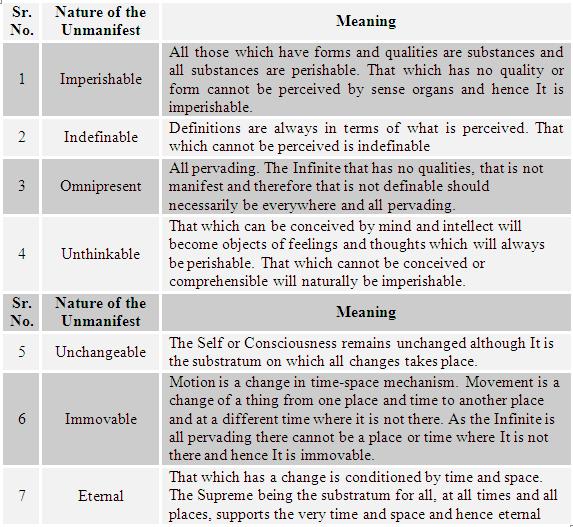FEATURES OF THE UNMANIFEST
ye twaksharamanirdeshyamavyaktam paryupasate
sarvatragamachintyam cha kootasthamachalam dhruvam // 12.3 //
Those who worship the Imperishable, the Indefinable, the Unmanifest, the Omnipresent, the Unthinkable, the Unchangeable, the Immovable and the Eternal
samniyamyendriyagraamam sarvatra samabuddhaya
te praapnuvanti maameva sarvabhootahite rataah // 12. 4 //
Having restrained all the senses, even minded in all conditions, rejoicing ever in the welfare of all beings - indeed they also come to Me (just like the others).
The nature of the Unmanifest specified in the Verse 3 and their explanations are given in the following table.

The seeker who meditates upon the unmanifest which is of the above mentioned nature has to fulfil the following three conditions mentioned in the Verse 4.
•Having restrained all the senses - He has to avoid dissipation of his energies through the sense organs and redirect his energies so conserved in pursuit of higher thoughts. The senses are to be restrained but not rejected.
•Even-minded in all conditions or Always equanimous - Intellectual equanimity in all conditions and situations while living in the world is a fundamental requisite for successful meditation. Maintenance of one's own balance in spite of his favourable and unfavourable experiences while living in contact with world is called equanimity.
•Intent on the welfare of all - He should be the one who is ever ready to serve others to the best of his abilities.
Sri Krishna says that they also who meditate on the unmanifest in the aforesaid manner reach Him; they too reach the same goal, the Supreme Self. But the Lord adds a rider here.
CONCENTRATION ON THE UNMANIFEST, A DIFFICULT TASK FOR THE WORLDLY
klesho'dhikatarasteshaam avyaktaasaktachetasaam
avyaktaa hi gatirduhkham dehavadbhiravaapyate // 12.5 //
Greater is their trouble whose minds are set on the Unmanifested; for, the goal - the Unmanifested - is very hard for the embodied to reach.
The embodied: Those who identify themselves with or attached to their bodies (Dehabhimana).
Those who seek the Manifested Lord and those who seek the Unmanifested Lord reach the same goal. But the path taken up by the latter is arduous because the aspirant has to practise utmost self-control, renounce the world outwardly and inwardly, wipe out all human emotions and desires and still the mind in the contemplation of the Absolute. It is also extremely difficult to fix the restless mind on the formless and attributeless Self. Such a method of contemplation demands a sharp, one pointed and subtle intellect. The Immutable does not offer an easy hold to the mind and the path is more arduous.
For a majority of the seekers meditation upon The Lord as expressed in the Universe, a Personal God (manifested form) is easier because they have a tangible ideal of the Lord to whom they can direct their feelings, emotion, love, will, energies and knowledge.